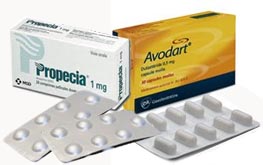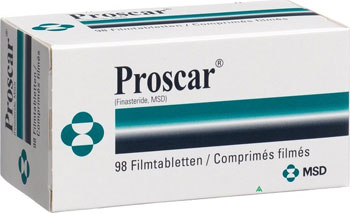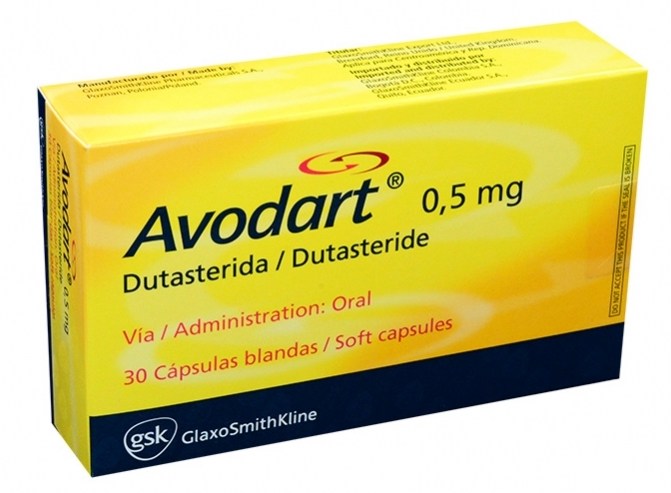Drugs Used In Enlarged Prostate Treatments Linked To High-Grade Prostate Cancer!
Source: Thailand Medical News Oct 20, 2019 6 years, 1 month, 3 weeks, 3 days, 14 hours, 47 minutes ago
Typically the standard treatment protocol for the last 8 years for males with
enlarged prostate is a type of
drug called a 5-alpha reductase inhibitor (5-ARI). These US FDA approved drugs that also used globally, shrink the gland to improve urinary flow, and the approved forms used for treating enlarged prostates come in two varieties:
Proscar (
finasteride) and
Avodart (
dutasteride).However, these drugs have a side effect of suppressing blood levels of prostate-specific antigen (PSA) by between 50 to 65% as a results physicians monitoring PSA levels of patients during prostate
cancer screenings are getting false or artificially low readings, and might assume that there is no need any additional prostate
cancer testing.
A study by the University of California, San Diego School of Medicine that involved over 80,000 prostate
cancer patients highlights this risk. Men in the study who developed prostate
cancer while taking a 5-ARI inhibitor had significant delays in diagnosis compared to nonusers. And because those cancers were discovered at more advanced stages, the men’s outcomes were also comparatively worse.
The study was led by Dr. Brent S. Rose, assistant professor in the department of radiation medicine and applied sciences.
Typically,
PSA tests raise red flags for prostate
cancer when the measured values are 4 nanograms per milliliter (ng/mL) or higher in blood. As a general rule, doctors can double the measured PSA result in men taking a 5-ARI inhibitor to account for the 50% reduction in actual blood levels. So if a man’s test reads 3.5 ng/mL, then the doctor can interpret the value as 7 ng/mL, which would ordinarily trigger a prostate imaging test or a biopsy to look for
r:rgb(255, 255, 102); border-radius:3px; box-shadow:rgb(229, 229, 229) 1px 1px; color:rgb(0, 0, 0); font-style:inherit; padding:1px">cancer in the gland.
The team speculated that this doubling occurs infrequently in the general
medical community. To investigate, they looked at 80,750 prostate
cancer cases documented in the Veterans Affairs database between 2001 and 2015. They focused specifically on differences between males who either were or were not taking 5-ARIs when they were diagnosed with prostate
cancer. The males on 5-ARI inhibitors had been taking the drugs for a median of 4.8 years before the prostate
cancer was detected.
The results of the study showed males on 5-ARI inhibitors fared worse in all respects: the time to diagnosis triggered by PSA readings among males using 5-ARI inhibitors was 3.6 years, compared to 1.4 years for nonusers, and there were also statistically higher numbers of high-grade tumors, a higher frequency of
cancer in the lymph nodes, and metastatic tumors spreading in the body among males who were taking 5-ARI inhibitors. Lastly, the prostate
cancer-specific death rate at 12 years was 13% among 5-ARI inhibitor users, compared to 8% among nonusers and males taking other treatments for enlarged prostates that don’t affect PSA.
The research team emphasize that the findings don’t mean 5-ARI inhibitors are inherently unsafe, or that PSA screening is ineffective in men who take these treatments. Indeed, other studies have shown no impact on survival for men on 5-ARI inhibitor therapy and fewer
cancer deaths among them compared to nonusers “but these studies also required strict adjustment of PSA level,” to account for how the drugs suppress PSA levels.
The team also admit that they do not know how many doctors do or do not adjust for PSA suppression among men who take 5-ARI inhibitors. But the new results, they claim, suggest that such adjustments aren’t routinely performed, and that there is a continued need to raise awareness of 5-ARI–induced suppression of PSA, in addition to clear guidelines on how to manage it.
Dr. Marc Garnick, Gorman Brothers Professor of Medicine at Harvard
Medical School and Beth Israel Deaconess
Medical Center, and editor in chief of the site: Harvard Prostrate Knowledge the findings are disturbing. According to Garnick, 5-ARIs have been extensively studied, and an FDA review panel associated the drugs with an increased risk of higher-grade prostate
cancer compared to placebo.
In a phone
interview with Thailand Medical News, he commented “The current study underscores that same finding. And whether it is due to a diagnostic delay resulting from lower PSA levels or whether these drugs are affecting the biological behavior of the
cancer itself should be a source of continued investigations. In the meantime, these drugs do have good efficacy in controlling the symptoms of an enlarged prostate, and a frank discussion needs to be undertaken with the patient and physician before the prescription is filled.”
Patients are advised not to discontinue any drugs that they have been prescribed with involving 5-ARI inhibitors, rather they are asked to consult their physicians and also get a new PSA screening done taking into considerations adjustments that need to be taken, coupled with additional screening methods should they suspect they have prostate
cancer.
Reference:
Association of Treatment With 5α-Reductase Inhibitors With Time to Diagnosis and Mortality in Prostate Cancer. Sarkar RR, Parsons JK, Bryant AK, Ryan ST, Kader AK, McKay RR, D'Amico AV, Nguyen PL, Hulley BJ, Einck JP, Mundt AJ, Kane CJ, Murphy JD, Rose BS JAMA Intern Med. 2019 Jun 1;179(6):812-819. doi:10.1001/jamainternmed.2019.0280.


